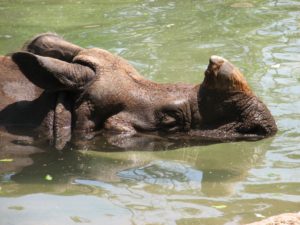Floods in Assam are a threat to the one-horned rhinoceros population
Floods in Assam, a North-east Indian state, have led to dwindling of number of Indian rhinos, also known as the one-horned rhinoceros. This animal finds a place on the endangered species list, with the status of being vulnerable. More conservation efforts for this animal are needed, even with instances of unique efforts.
Approximately two thirds of the world’s one-horned rhino population resides in Kaziranga National Park, a wildlife sanctuary that is situated within Nagaon and Bokakhat districts in the state of Assam, in the North East part of India.
A very rich biodiversity in the region had the National Park termed as a biodiversity hotspot and was recognised as a UNESCO World Heritage in 1985 for its unique natural environment.
Animals housed in this park have been at the receiving end of the natural disaster in the form of floods that the Indian state is facing currently. Apart from the drowning of close to 15 one-horned rhinos, most of whom were calves, a large number of hog deer and wild boars are among the animals who have lost their lives by being submerged under the torrential rain waters.
Floods in the state, as visible since the end of July, have also affected human life and have caused infrastructural damage to other regions of the state. More than 20 districts of the state have been affected, leading to a critical situation that is still being addressed.
Forest guards, non-governmental organisations’ members and local people have been part of rescue operations for the animals. Many are taking steps to deal with the situation and also nurse back to health the rhinos that have been injured. Malnutrition and ill health of the rhinos are also being noted.
Some children of a primary school in Assam were reportedly very affected, in the previous week, by the predicament the rhinos were in. These children from Nepali Khuti Banuwa LP School, located near Oriole Park, east of Bokakha in Assam voluntarily sacrificed their Midday meal (a school meal programme of the Government of India aimed at improving nutritional status of children) in order to procure funds to buy milk for a baby rhino.
Inspired by the children, seven other teachers, managing committee members, businessmen and others added to the funds to purchase more milk packets. Despite the temporary nature of the solution, it was a voluntary initiative taken to tackle the problems faced by rhinos.
Challenging road ahead
While the situation that the rhinos are currently facing in lieu of the floods is being dealt with slowly, the challenges rhinos have faced for years is far from being dealt with. The horn that is possessed by the animal has made it vulnerable to poachers who seek it for its medicinal value. It is considered as an important ingredient for a number of traditional Asian medicines. Along with the persistent threat of poaching, habitat destruction over the years has also had disastrous results for the survival of the species.
However, with small initiatives being taken up by individuals and small groups, and renewed focus on the animal, through initiatives such as Indian Rhino Vision 2020, an international initiative aimed at increasing its population, notably in Assam, rhinos might stand a chance of braving this storm.










